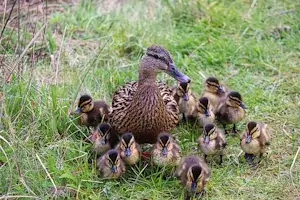Introduction: Why Keep Ducks?
Ducks are not only cute and entertaining animals but also useful helpers in the garden. They eat weeds, snails, and other pests, provide fresh eggs, and are excellent pets for families. However, before starting duck keeping, there are several important considerations to ensure the animals lead a happy and healthy life. In this article, you’ll learn everything you need to know – from the right housing and feeding to care.
1. Requirements for Keeping Ducks
Are Ducks Allowed?
Before getting ducks, it’s important to check the legal regulations in your area. In most cases, keeping ducks is allowed, but there may be restrictions depending on the number of animals and the residential area.
Space Requirements and Environment
Ducks need plenty of space to feel comfortable. A proper enclosure should provide at least 10 m² per duck. Additionally, access to a pond or a water source is essential, as ducks are natural swimmers and need water to clean their feathers.
2. The Right Accommodation for Ducks
The Enclosure
A secure enclosure protects your ducks from predators such as foxes or martens. It should be surrounded by a strong fence and secured at the top, as some predators may attack from above.
The Duck House
A duck house provides protection from bad weather and predators at night. It’s important that the house is:
- dry, well-ventilated, and protected from drafts,
- at least 1 m² per duck,
- lined with a thick layer of straw or wood shavings.
Pond or Water Source
Ducks love water! A small pond or a large tub is often enough to keep them happy. Be sure to clean the water regularly to prevent diseases.
3. Feeding Ducks
What Do Ducks Eat?
Ducks are omnivores and require a varied diet. Their menu should include:
- Green feed: Grass, herbs, lettuce, and vegetables,
- Grains: Corn, oats, wheat, or commercial duck pellets,
- Proteins: Snails, worms, and insects – especially important during the breeding season.
Don’t Forget Water
Ducks drink a lot of water, especially while eating. Make sure they always have access to fresh water.
4. Care and Health
Cleaning the Enclosure
A clean enclosure is crucial for the health of your ducks. Regularly remove droppings and leftover food to prevent disease.
Feather Care
Ducks take care of their feathers themselves but need water for this. A pond or tub helps them remove dirt and keep their feathers waterproof.
Veterinary Visits
Regular check-ups with a veterinarian are recommended to detect diseases early. Vaccinations may also be important, depending on the region and type of care.
5. Social Behavior and Activity
Ducks are social animals and should be kept in pairs at a minimum. They love waddling through the grass, splashing in water, and exploring their surroundings. Engage your ducks by hiding food or placing small obstacles in their enclosure.
6. Duck Eggs: Production and Use
Laying Eggs
Ducks typically lay 100–300 eggs per year, depending on the breed and care. Their eggs are larger than chicken eggs and have a more intense flavor – perfect for cooking!
Breeding Time
If you want to breed ducklings, you can either let a broody duck sit on the eggs or use an incubator. The incubation period lasts about 28 days.
7. Benefits of Duck Keeping
Keeping ducks offers many advantages:
- They help with biological pest control,
- Their eggs are nutritious and delicious,
- Ducks are easier to care for than many other farm animals,
- They enrich your daily life with their lovable behavior.
8. Frequently Asked Questions About Duck Keeping
Are Ducks Loud?
Depending on the breed, ducks can vary in volume. Some breeds, such as the Runner Duck, are relatively quiet, while others, like the Pekin Duck, may be louder.
Can Ducks Stay Outdoors All Year?
Yes, ducks are hardy and can stay outside year-round as long as they have a sheltered duck house and enough food during the winter months.
Conclusion: Duck Keeping – Enrichment for Your Garden and Life
Keeping ducks is not only an exciting experience but also an enrichment for your home. With proper preparation and care, you can offer your ducks a natural life while benefiting from their many advantages. Whether as natural pest controllers, egg producers, or simply lovable companions – ducks are a great choice for any animal lover.ahl für jeden Tierfreund.

